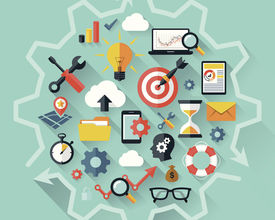"Big Data", "deep learning", "data visualization", "attendee tracking", "data-driven marketing", ... these are some of the event planning-related concepts many event planners struggle to understand.
No doubt, we may encounter event managers who have a strong grasp of the above-mentioned terms, but they are the minority. As for the rest of us, it can be truly annoying to stumble upon multiple tech-oriented event planning articles, which promise a bright future for us as organizers, while we understand almost nothing from what we read.
It's as if trying to decode or translate something from a foreign language we don't speak. And even if we search for more information about big data, machine learning, or data tracking, it's impossible to connect the dots and foresee how these concepts can change the future of our professional life.
However, as researchers Seungwon 'Shawn' Lee, Dessislava Boshnakova, and Joe Goldblatt note: "The rapid technological development in the field of meetings and events will accelerate even more. Technology can create many new positions for modern event planners while bringing technological challenges to many event professionals at the same time. It is in this realm that modern event planners and those who are about to get into the field of event management need to improve their technological skills along with the fundamental skills of traditional event management."
So let's start do that by demystifying this territory and by understanding the remarkable ways technology can boost our future events.
No more logistic struggles
The number one reason why we use technology when designing, planning, and running events is to diminish or eliminate the logistic struggles. And we already can see the results.
For example, instead of printing event programs (after which, of course, the program would change), we can use digital programs that attendees can access via event apps. Or, instead of manually organizing the one-on-one meetings between our networking event guests, we can do it automatically with the help of a good B2B matchmaking platform. But that’s only the beginning. With processes such as machine learning, event managers will have access to applications that will minimize logistic management.
According to Lee, Boshnakova, and Goldblatt, technology advances will increase the speed of decision-making and will enable "the ability to automate many functions within meeting and event management" that usually requires substantial time and effort from event planners. Subsequently, by diminishing logistic dilemmas (which are both time- and energy-consuming), we’ll have more time for creativity and innovation.
Replicable events
Sometimes the potential of the event technology that we already use is so big that we can’t even understand its full capabilities. By gradually automatizing everything, collecting big amounts of data, and setting up smart filters to analyze attendee-provided information, we can take one event and replicate it as many times we want. As Lee, Boshnakova, and Goldblatt note: "Thanks to new technologies, every single local event now has the potential of going global." Using the right tools, we can set the blueprint of an event and then repeat it in different contexts, cities, or countries, maintaining the same planning parameters and configurations.
Efficient targeting
The information you gather about attendee behavior during your event is irrelevant without an intelligent tool that would help you get the most out of the data. As Kai Waehner writes in his article about machine learning, "A data discovery tool might be enough for a business user to find problems, new insights or patterns in historical data. But for analyzing Big Data, he often needs help from a data scientist who can use machine learning algorithms to create analytic models."
Yet, the evolution of deep analytics and machine learning technologies will make this feature easy to access without third-party intervention.
What you can do with it?
First, you’ll be able to personalize the marketing process. And by personalizing, think about truly deep personalization. You’ll know everything about your attendees (with whom they interacted during the previous event, what keynote speakers they liked, how they felt and how the event added value to their businesses, etc.).
Thus, you’ll be able to communicate individually (and automatically) with each respective guest. This means that your mail campaigns will target each person with customized messages. Secondly, you’ll be able to efficiently segment your attendees, tailoring personalized event experiences for each group. In other words, we already have the tools to gather the data. The next step is to acquire and work with tools that will help us manage all the information and use it wisely to increase the attendance rate and participant satisfaction.
Wrap up
Knowing how technology works is only half of the process. By thoroughly understanding how we can use its potential for our professional benefit, we’ll learn how to find unexpected solutions to our planning issues and how to co-create and co-establish the future of the event industry.







